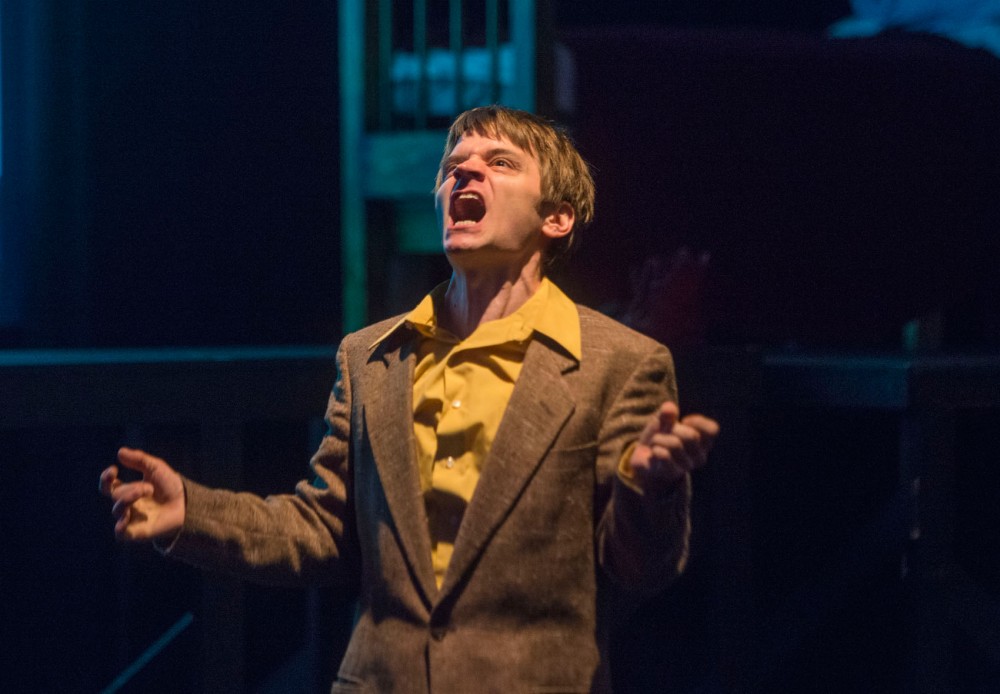Playwright and director Aravind Enrique Adyanthaya never thought he would get into theater professionally. It took moving to Minnesota from his home of Puerto Rico and getting his M.D. at Mayo Medical School for him to realize his true passion.
“I come from a family of doctors,” he said. “But I think I wanted to help others and myself in another way.”
The University of Minnesota alumnus is opening his new play, “Bandara,” with Pangea World Theater and Teatro Del Pueblo this week for their Latino Asian Fusion Series. This marks the first time the two theaters have teamed up to produce a series that builds bridges between their respective audiences and to offer a venue for connection.
“Bandara” is centered on this communal connection. The play follows two storylines as well as other fragmented tales — the first focuses on a Puerto Rican pathologist struggling with his multicultural identity in New York City as he tries to build relationships.
As the doctor becomes more and more isolated, the audience is introduced to an Indian woman who loses a child she was caring for at an orphanage. An investigation follows, and the woman hallucinates human-monkey creatures mysteriously connected to the cultural heritage of both main characters.
While the narrative evokes the supernatural, “Bandara” is more autobiographical than it appears. Adyanthaya’s mother is Puerto Rican, and his father is from India.
“I consider myself Puerto Rican — it’s ingrained in me. But India has always been inside me,” he said. “How can I be part of the family and separate from the country?”
Adyanthaya hasn’t found any universal answers. “Bandara” is a way to wrestle with that question, he said, and he’s made profound discoveries through the show.
“I’m learning about how you can establish relationships of longing on stage,” he said.
Adyanthaya has found a home in multiple locations, including Minnesota. This is his first time back since 2003, but his history here is deep — Adyanthaya received a Ph.D. in Theatre Historiography from the University more than nine years after getting his M.D. in 1992.
Both Adyanthaya’s experiences and those portrayed in “Bandara” fall perfectly in place with the Latino Asian Fusion Series. Teatro Del Pueblo artistic director Alberto Justiniano said Adyanthaya is an artist he’s been waiting for.
“I’ve known [Adyanthaya] for years; I knew him when he was still getting his Ph.D. at the U,” he said. “It’s been a long time — I’ve always told him I was gonna get him back somehow.”
Adyanthaya and Justiniano worked together on social justice programming through Teatro del Pueblo in the past, drawing heavily from the work of Augusto Boal and the Theater of the Oppressed.
The pair, along with other artists, worked with troubled communities and directed them to recreate situations they had experienced together. The goal was to isolate the harmful events, examine them and potentially prevent them from reoccurring.
Justiniano said his time working with a school that was recovering from a shooting incident still sticks in his mind.
“[Adyanthaya] was acting for us at the time,” Justiniano said. “Working with that school was a huge success — it was controversial because we let the suspended students come back to work with us, but it turned out to be really positive.”
This theater tactic — creating conversation — is at the heart of Adyanthaya’s work. Whether he’s tackling personal issues of identity or looking to connect the larger community, Adyanthaya said that interaction is the key.
“I like to embrace visceral experiences,” he said. “It has a way of changing how we perceive and think about the world.”








